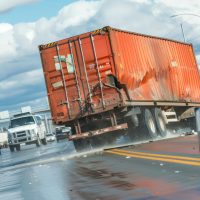What Causes a Tractor-Trailer to Jack-knife?

Tractor-trailers are massive vehicles that require the driver to use professional skills and knowledge to avoid dangerous and potentially deadly crashes. One of the most serious types of 18-wheeler crashes is a jackknife, which occurs when the trailer swings out to the side, forming an acute angle with the cab or tractor. This can result in multi-vehicle collisions across multiple lanes and cause catastrophic injuries. Below we look at the main reasons a jack-knife crash happens and how truck drivers and trucking companies can be liable for negligence that caused a jackknife, which is always preventable by the driver of the tractor-trailer. If you or a loved one has been hurt in a semi-truck crash in Beaumont, southeast Texas or statewide, contact Gilbert Adams Law Offices to speak with a skilled and experienced Texas truck crash attorney.
1. Sudden Braking
One of the most common causes of a jackknife wreck is sudden or untimely braking. When a truck driver slams on the brakes, the trailer can lose traction and swing out of alignment with the cab. This often happens when drivers have reacted too slowly to traffic congestion, road hazards or other road obstacles. Road conditions, such as wet or icy surfaces, can exacerbate the problem, making it even more difficult to regain control.
2. Speeding and Sharp Turns
Excessive speed increases the likelihood of a jackknife. If a truck is traveling too fast, especially around curves or downhill slopes, the weight of the trailer can shift uncontrollably. When a driver tries to correct the movement, the trailer may swing out and jack-knife. Truckers must maintain safe speeds and adjust their driving according to road, traffic and weather conditions.
3. Poor Road Conditions
Slippery roads due to rain, ice, or snow reduce traction between a truck’s tires and the roadway. When a truck’s tires lose grip, it becomes much harder to control the tractor-trailer, leading to a potential jack-knife. Uneven pavement, potholes, and debris can also contribute to loss of control, making defensive driving techniques essential for truckers.
4. Uneven or Improperly Loaded Cargo
The way cargo is loaded onto a tractor-trailer can significantly impact its stability. If a truck’s cargo is unevenly distributed, unsecured or overloaded, it can create an imbalance that makes jack-knifing more likely. Shifting cargo can cause the trailer to swing unpredictably, especially during braking or sharp turns. Trucking companies, freight shippers and drivers must ensure that cargo is properly loaded and adequately secured to prevent dangerous weight shifts.
5. Mechanical Failures
Equipment failures, such as malfunctioning brakes, worn-out tires, or issues with the truck’s coupling system, can contribute to jack-knife crashes. When brakes fail or do not provide even braking pressure, the trailer may not slow down at the same rate as the cab, leading to a loss of control. Regular maintenance and inspections of both the tractor and trailer are essential to ensure that all components are functioning properly.
6. Driver Fatigue and Inexperience
Fatigue is a major factor in all types of truck crashes, including jack-knifes. A drowsy or exhausted driver has slower reaction times and may struggle to maintain control of the truck in hazardous situations. Inexperienced drivers may also lack the skills needed to manage a tractor-trailer safely, particularly when encountering adverse conditions or emergency braking situations. Trucking companies must ensure their drivers receive adequate training and follow regulations limiting hours of service to prevent fatigue-related crashes.
Legal Options After a Jack-knife Crash Injury
When a jack-knife crash results in injuries to others, determining liability can be complex. The truck driver, trucking company, cargo loaders, or vehicle maintenance providers may all share responsibility depending on the circumstances. Victims of jack-knife truck crashes may be entitled to compensation for medical bills, lost wages, property damage, physical impairment and pain and suffering, but identifying the responsible party and building a strong case proving their liability requires significant legal expertise and tenacity.
If you or a loved one has been injured in a jackknife truck crash in Southeast Texas or statewide, the experienced legal team at Gilbert Adams Law Offices is here to help. We fight to hold negligent parties accountable and seek maximum compensation for our clients. Contact us today for a free consultation to discuss your case.
